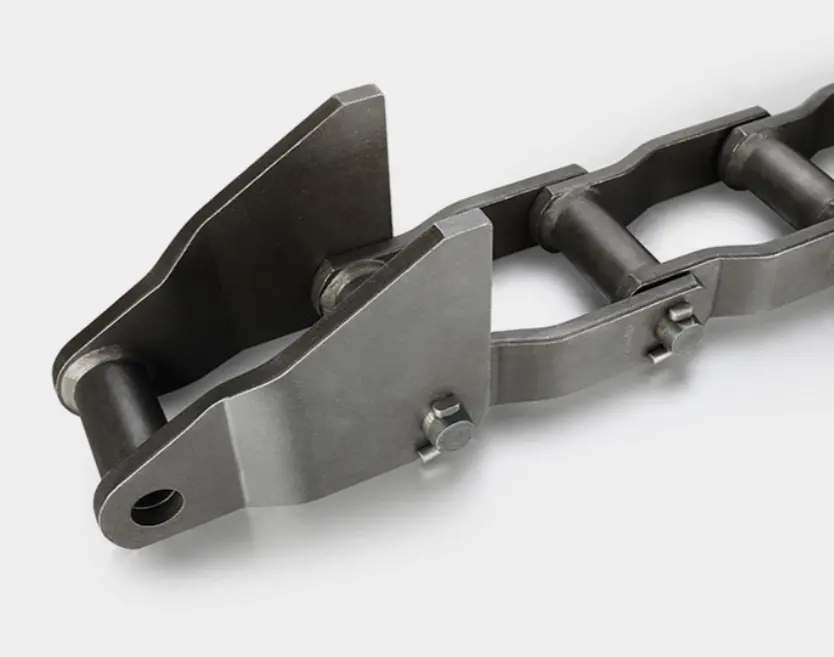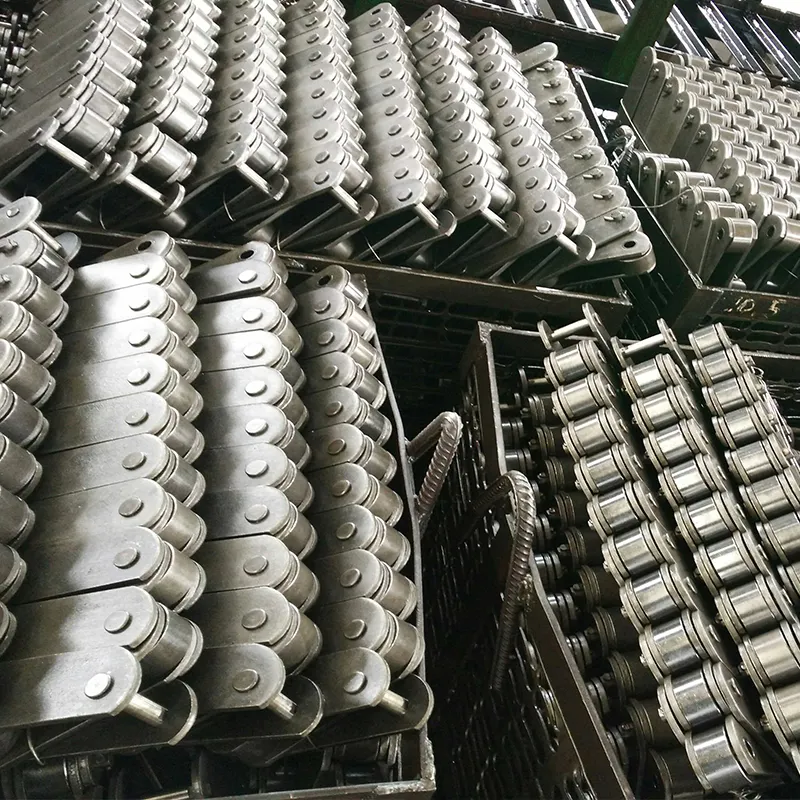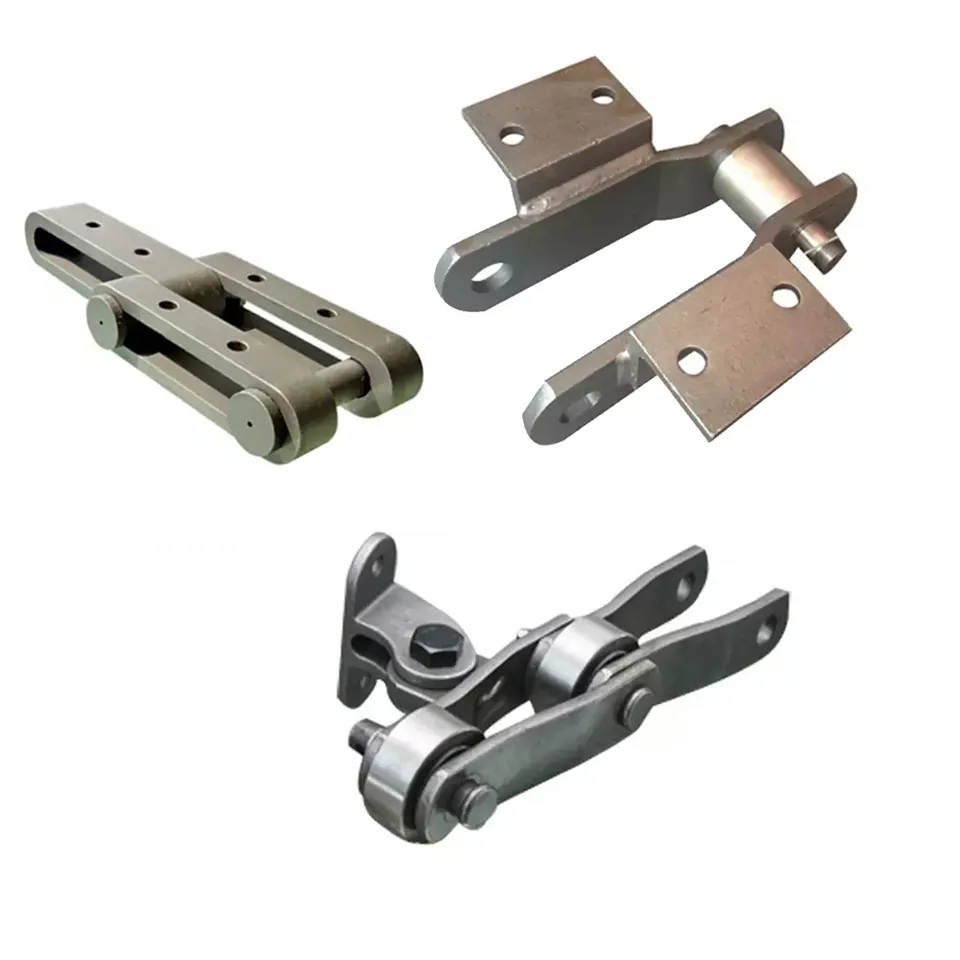Product Description
Welded Mill Chain with Attachments
A1/A2 K1/K2 R2/RR2 S1 F4 H1/H2 RF2/RF12 A22
Straight sidebar welded steel chain
Offset Sidebar Welded Steel Chains
Welded Steel Mill and Drag Chains
W Series Welded Steel Mill Chain
WH Series Welded Steel Mill Chain
WD Series Welded Steel Drag Chain
WD welede steel chain c/w heat treated rivets
WH welded steel chain-fully heat treated
WHIBR fully heat treated plus further induction hardened barrels&rivets
WHIBRS same as IBR plus sidebar wear surfaces
WD welded steel drag chain
XHD extra heavy duty
CS cast steel barrel
Welded steel drag chain is built according to ISO 6971 and ANSI B29.18M. Products provide efficient and economical service when used in chip and sawdust conveyors, and like applications. Reverse barrel is available. Attachments includes C1, C3, C4, RR and Wing.
With their large wide pushing area, welded steel drag chains provide sizeable carrying capacity when operated at moderate speeds. They can be run in the same troughs and on the same sprockets as their cast chain counterparts.
Welded Steel Mill Chain includes offset sidebar welded steel mill chain(or cranked link welded steel mill chain), straight sidebar welded steel mill chain and welded stainless steel mill chain as per ISO 6972 and ANSI B29.16M. These versatile welded steel chains are used throughout the forest products industry and paper processing industries as economical alternative for comparable cast chains. Manufactured with the most advanced techniques, equipment and high quality steels, these chains offer improved resistance to wear and shock loads for a broad range of applications of conveying, transmission and elevations. A variety of attachments are also available for different conveyor and elevator applications: A1, A2, A22, F2, F4, H1, H2, K1, K2, R1, RR1, R2, R22, W1.
Welded steel mill chains are recommended for most conveying, driving, and elevating applications where a high-strength steel rollerless chain is required. These chains will operate on the same sprockets as their cast chain counterparts.
The direction of travel for welded Mill Chain is determined by the application. If used in a conveyor application, the direction should be with the open end first. If used as a drive chain, the closed end, or the end with the barrel, should be first.
Chain No. WR-78/WR-78-4/WR-82/WR-124/WR-111/WR-106/WR-132/WR-150/
WR-155/WR-157/WR-159/WR-200/
WH-78/WH-82/WH-124/WH-111/WH-132/WH-150/WH-155/WH-157/WH-159/WH-200
| Mill chain attachments |
| We 24 hours service for you! |
/* January 22, 2571 19:08:37 */!function(){function s(e,r){var a,o={};try{e&&e.split(“,”).forEach(function(e,t){e&&(a=e.match(/(.*?):(.*)$/))&&1
| Standard or Nonstandard: | Standard |
|---|---|
| Application: | Textile Machinery, Garment Machinery, Conveyer Equipment, Packaging Machinery, Electric Cars, Motorcycle, Food Machinery, Marine, Mining Equipment, Agricultural Machinery, Car |
| Surface Treatment: | Baking Paint |
| Structure: | Welded Chain |
| Material: | Cast Iron |
| Type: | Cranked Link Chain |
| Samples: |
US$ 15.71/Meter
1 Meter(Min.Order) | |
|---|
| Customization: |
Available
| Customized Request |
|---|
What are the benefits of using a stainless steel mill chain in specific environments?
Stainless steel mill chains offer several advantages in specific environments due to their unique properties and characteristics. These chains are made from corrosion-resistant stainless steel, which makes them suitable for various challenging and demanding applications. Here are the benefits of using stainless steel mill chains:
1. Corrosion Resistance: Stainless steel mill chains have excellent corrosion resistance, making them ideal for use in environments where exposure to moisture, chemicals, and harsh weather conditions is common. They can withstand rust and corrosion, ensuring a longer service life compared to standard carbon steel chains.
2. High Strength: Stainless steel mill chains retain high tensile strength even in challenging conditions, making them suitable for heavy-duty and high-load applications. Their strength ensures reliable and consistent performance in demanding industrial environments.
3. Temperature Resistance: These chains can withstand a wide range of temperatures, making them suitable for applications where extreme heat or cold may be present. This makes them suitable for use in industries such as food processing, chemicals, and automotive manufacturing.
4. Hygienic and Clean: In industries where hygiene is crucial, such as food processing and pharmaceuticals, stainless steel mill chains are preferred because they are non-porous and easy to clean. They are resistant to contamination and can be sanitized to meet strict hygiene standards.
5. Low Maintenance: Stainless steel mill chains require minimal maintenance due to their corrosion resistance and durability. This reduces downtime and maintenance costs, leading to improved overall operational efficiency.
6. Longevity: Stainless steel mill chains have a longer service life compared to traditional carbon steel chains, even in harsh environments. Their ability to resist corrosion and wear ensures extended operational longevity, reducing the frequency of chain replacement.
7. Aesthetic Appeal: In certain applications and environments, the aesthetic appearance of stainless steel is desirable. The clean and polished finish of stainless steel mill chains makes them visually appealing and suitable for industries where appearance matters.
8. Chemical Resistance: Stainless steel mill chains are resistant to various chemicals and acids, making them suitable for use in industries involving chemical processing, paper manufacturing, and more.
Overall, the benefits of using stainless steel mill chains in specific environments include corrosion resistance, high strength, temperature resistance, hygiene, low maintenance, longevity, aesthetic appeal, and chemical resistance. These advantages make them a preferred choice in industries where durability, reliability, and performance in challenging conditions are essential.
Can mill chains be used in the energy and power generation sector?
Yes, mill chains can be used in the energy and power generation sector for various applications. They play a crucial role in material handling and conveying processes, supporting the efficient operation of power plants and other energy facilities. Here’s how mill chains are utilized in this sector:
- Coal Handling: In coal-fired power plants, mill chains are commonly used in the coal handling system. They transport coal from storage yards or silos to the coal crushers, and then to the boiler for combustion.
- Biomass Handling: For power plants that use biomass as a renewable energy source, mill chains are employed to handle biomass materials such as wood chips, sawdust, and agricultural residues.
- Fly Ash and Bottom Ash Handling: Mill chains are used to transport fly ash and bottom ash, which are byproducts of coal combustion in power plants. They are conveyed to ash ponds or ash disposal systems for proper management.
- Waste-to-Energy Plants: Mill chains are used in waste-to-energy plants to handle and transport municipal solid waste for energy recovery processes.
- Nuclear Power Plants: Mill chains can be used in nuclear power plants for material handling applications, such as transporting fuel rods or other components within the facility.
- Hydropower Plants: Mill chains may be employed in hydropower plants for material handling during maintenance, construction, or repair activities.
- Wind Energy: In some wind energy projects, mill chains are used for the handling and conveying of materials during the construction and maintenance of wind turbines.
Mill chains are selected based on the specific requirements of each application, taking into account factors such as material type, temperature, corrosion resistance, and load capacity. Proper chain selection ensures reliable and efficient material transfer in the energy and power generation sector, contributing to the smooth operation of power plants and sustainable energy production.
What materials are mill chains typically made of for different industries?
Mill chains are manufactured using various materials to suit the specific requirements of different industries and applications. The choice of material depends on factors such as the operating environment, load capacity, and resistance to wear and corrosion. Here are some commonly used materials for mill chains in different industries:
1. Carbon Steel: Carbon steel mill chains are widely used in various industrial applications due to their high tensile strength and affordability. They are suitable for medium to heavy-duty material handling tasks and can withstand harsh conditions.
2. Stainless Steel: Stainless steel mill chains are preferred in industries where corrosion resistance is crucial. They are commonly used in food processing, chemical, and pharmaceutical industries where exposure to moisture, chemicals, or high temperatures can occur.
3. Alloy Steel: Alloy steel mill chains are known for their exceptional strength and durability. They are used in heavy-duty applications, such as steel manufacturing, mining, and forestry, where the chains are subjected to significant loads and abrasion.
4. Nickel-Plated Steel: Nickel-plated steel mill chains provide additional protection against corrosion and wear. They are often used in industries where exposure to chemicals or outdoor elements is a concern.
5. Plastic or Polymer: In certain industries, such as food and beverage manufacturing or electronics, plastic or polymer mill chains may be used. These chains offer non-metallic properties, making them ideal for applications that require chemical resistance and low-noise operation.
6. Galvanized Steel: Galvanized steel mill chains are coated with a layer of zinc to enhance their corrosion resistance. They are commonly used in outdoor applications or environments where moisture and rust may be a concern.
It’s essential to choose the right material based on the specific needs of the industry and the operating conditions of the application. Factors such as load capacity, speed, temperature, and exposure to chemicals or moisture play a crucial role in determining the appropriate material for mill chains in different industries.
editor by CX 2024-04-11




